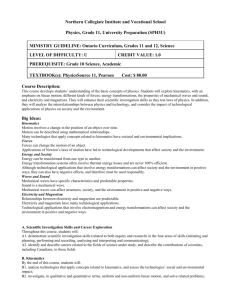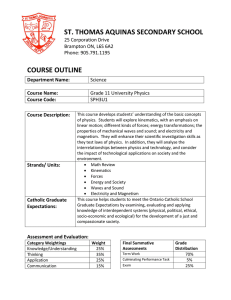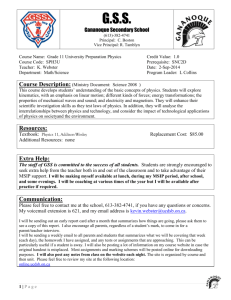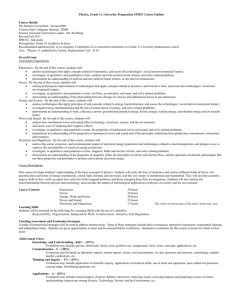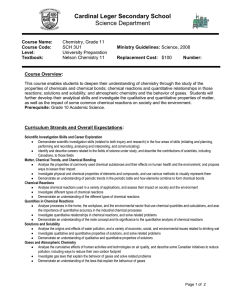Cardinal Leger Secondary School Science Department Course Overview:
advertisement
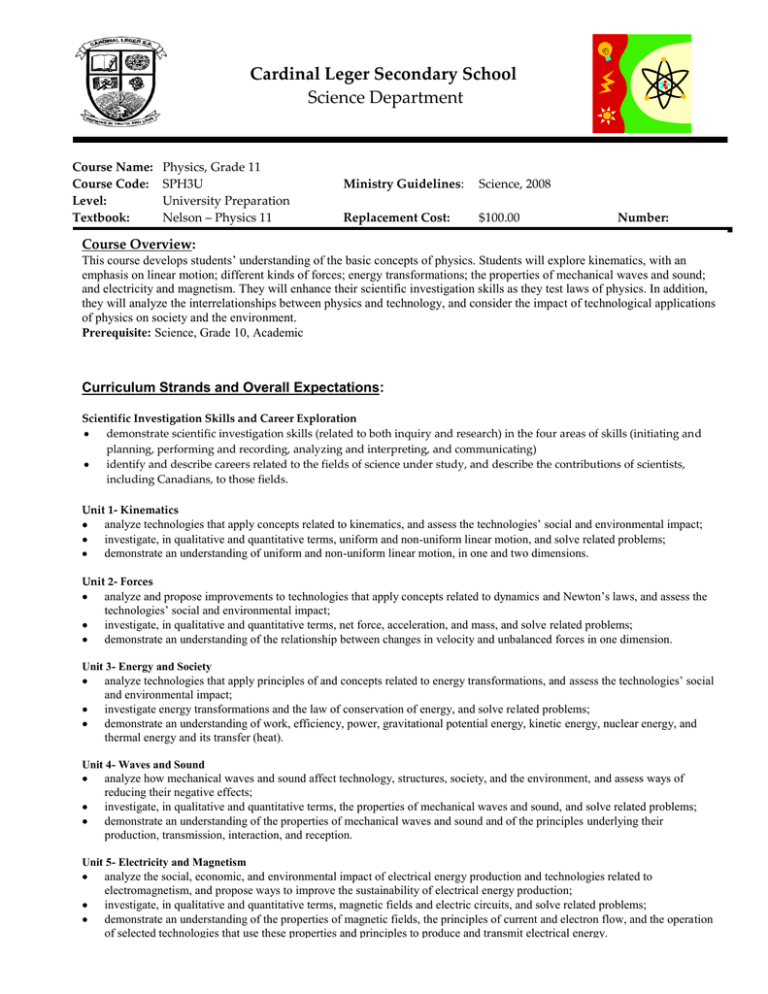
Cardinal Leger Secondary School Science Department Course Name: Course Code: Level: Textbook: Physics, Grade 11 SPH3U University Preparation Nelson – Physics 11 Ministry Guidelines: Science, 2008 Replacement Cost: $100.00 Number: Course Overview: This course develops students’ understanding of the basic concepts of physics. Students will explore kinematics, with an emphasis on linear motion; different kinds of forces; energy transformations; the properties of mechanical waves and sound; and electricity and magnetism. They will enhance their scientific investigation skills as they test laws of physics. In addition, they will analyze the interrelationships between physics and technology, and consider the impact of technological applications of physics on society and the environment. Prerequisite: Science, Grade 10, Academic Curriculum Strands and Overall Expectations: Scientific Investigation Skills and Career Exploration demonstrate scientific investigation skills (related to both inquiry and research) in the four areas of skills (initiating and planning, performing and recording, analyzing and interpreting, and communicating) identify and describe careers related to the fields of science under study, and describe the contributions of scientists, including Canadians, to those fields. Unit 1- Kinematics analyze technologies that apply concepts related to kinematics, and assess the technologies’ social and environmental impact; investigate, in qualitative and quantitative terms, uniform and non-uniform linear motion, and solve related problems; demonstrate an understanding of uniform and non-uniform linear motion, in one and two dimensions. Unit 2- Forces analyze and propose improvements to technologies that apply concepts related to dynamics and Newton’s laws, and assess the technologies’ social and environmental impact; investigate, in qualitative and quantitative terms, net force, acceleration, and mass, and solve related problems; demonstrate an understanding of the relationship between changes in velocity and unbalanced forces in one dimension. Unit 3- Energy and Society analyze technologies that apply principles of and concepts related to energy transformations, and assess the technologies’ social and environmental impact; investigate energy transformations and the law of conservation of energy, and solve related problems; demonstrate an understanding of work, efficiency, power, gravitational potential energy, kinetic energy, nuclear energy, and thermal energy and its transfer (heat). Unit 4- Waves and Sound analyze how mechanical waves and sound affect technology, structures, society, and the environment, and assess ways of reducing their negative effects; investigate, in qualitative and quantitative terms, the properties of mechanical waves and sound, and solve related problems; demonstrate an understanding of the properties of mechanical waves and sound and of the principles underlying their production, transmission, interaction, and reception. Unit 5- Electricity and Magnetism analyze the social, economic, and environmental impact of electrical energy production and technologies related to electromagnetism, and propose ways to improve the sustainability of electrical energy production; investigate, in qualitative and quantitative terms, magnetic fields and electric circuits, and solve related problems; demonstrate an understanding of the properties of magnetic fields, the principles of current and electron flow, and the operation of selected technologies that use these properties and principles to produce and transmit electrical energy. Cardinal Leger Secondary School Science Department Evaluation: Term Work 70% Knowledge and Understanding 25% Thinking 35% Communication 15% Application 25% Final Assessment 30% Formal Examination 20% Culminating Task 10% Course Total 100% Learning Skills and Work Habits Responsibility Organization Independent Work Collaboration Initiative Self-Regulation E= Excellent G=Good S=Satisfactory N= Needs Improvement Fulfills responsibility and commitments. Takes responsibility for and manages own behavior. Devises and follows a plan and process for completing tasks. Establishes priorities and manages time Independently monitors, assesses, and revises plans to complete tasks and meet goals. Uses class time to complete tasks. Accepts various roles and an equitable share of work in a group. Builds healthy peer-to-peer relationships. Looks for and acts on new ideas and opportunities. Approaches new tasks with a positive attitude. Sets own goals and monitors progress towards achieving them. Seeks clarification or assistance when needed. Missed/Late/Incomplete Assignments It is the student’s responsibility to address missed, late, or incomplete assignments. Students are expected to complete assignments and to adhere to assignment deadlines as follows: Due Date 10% Penalty Zone Closure Date A due date is set by the teacher. 1 school day late – 3% 2 school days late – 6% 3 school days late – 10% Maximum penalty of 10% Once the closure date has passed, work is considered incomplete and a mark of zero applies. Parent Signature: _______________________ Student Signature: ______________________
